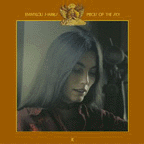![]()
  |

Pieces of the Sky
Emmylou Harris
Reprise 2213
Released: February 1975
Chart Peak: #45
Weeks Charted: 15
Certified Gold: 10/13/86
Country singers who are aware of the world that lies beyond the honky-tonk at one end of Main Street or the church at the other (and all that triangulating Family Life in between) are not as rare as they once were, but still we haven't exactly been inundated with female ones of that sort. Hold onto your hat or whatever, then.
It occurs to me that Ms. Harris may have some trouble with fidgety listeners because her voice sounds something like Linda Ronstadt's, but the song selection and arrangements lead to the kind of relaxed, open-minded listening in which differences rather than samenesses become important. Emmylou's voice is smooth, it has good range and a lovely tone that shimmers on the high notes, and she complements all this with a folksinger's straightforward phrasing. She puts across the too-rural-to-be-modern-country air of Dolly Parton ("Coat of Many Colors"), introduces another ("Boulder to Birmingham") she wrote with Bill Danoff (he who co-authored "Take Me Home, Country Roads" with John Denver), does well by Merle Haggard, the Louvin Brothers -- you name it. Even a slow-as-molasses experiment with Lennon and McCartney's "For No One" seems to work, profiting as it does from a wondrously economical and deeply felt electric guitar solo by Amos Garrett. The "regular" (Elvis') guitarist, James Burton, plays with similar economy and fine style, and it's all just... well, it's so good I've been sitting here instead of making the rounds. The church and the honky-tonk could've both burned down for all I know.
- Noel Coppage, Stereo Review, 6/75.
Bonus Reviews!
Abetted by Brian Ahern, who would have been wise to add some Anne Murray schlock, Harris shows off a pristine earnestness that has nothing to do with what is most likable about country music and everything to do with what is most suspect in "folk." Presumably, Gram Parsons was tough enough to discourage this tendency or play against it, but as a solo mannerism it doesn't even ensure clear enunciation: I swear the chorus of the best song here sounds like it begins: "I will rub my asshole/ In the bosom of Abraham." C+
- Robert Christgau, Christgau's Record Guide, 1981.
"Priceless!" applauded admirers of this incredibly strong album that announced with authority the arrival of one of the most adventurous and truly great voices in country. Her pure and honest sound acknowledges rock but remains faithful to the genre's rural roots, and even decades later it's still hard to top the crystal clear elegance of this angelic musical treasure. * * * * *
- Zagat Survey Music Guide - 1,000 Top Albums of All Time, 2003.
Still recoiling from the death of her friend, duet partner, and mentor, Gram Parsons, Emmylou came under the sensitive control of Brian Ahern, who had enjoyed success with another female vocalist, Anne Murray. Harris has effectively carried the torch for Parsons ever since.To record this, her first post-Parsons solo album, a large house was rented in Beverly Hills, and Ahern's mobile studio was set up in the yard. Ahern did not want to make a straight country album, and assembled a session band including two members of Elvis' Vegas band -- guitar legend James Burton and ex-Cricket Glen D. Hardin as arranger and pianist. He also invited Bernie Leadon of The Eagles, Billy Payne of Little Feat, and Herb Pedersen (ex-Dillards) as harmony vocalist.
Several familiar songs were selected as well as original material such as "Bluebird Wine," by the then unknown Rodney Crowell, and Harris' personal tribute to Parsons, "Boulder To Birmingham." Most of the other songs were well known. Mixing Merle Haggard with The Beatles with The Louvin Brothers was intrepid to say the least, but it sounded fabulous.
It says much for Emmylou that musicians like Burton and Hardin, as well as Crowell, became members of the appropriately named Hot Band, which toured with her for several years. Other notables lending a hand here included Amos Garrett on guitar and fiddlers Richard Greene and Byron Berline. The fifth and tenth tracks were live recordings featuring the bar band she had fronted before catching the ears and eyes of Parsons.
- John Tobler, 1001 Albums You Must Hear Before You Die, 2005.
Even before she recorded onher own, the young Emmylou Harris turned heads with some of her first trips to the recording studio: She was the haunting and haunted female voice accompanying Gram Parsons on his glavanizing 1972 solo debut GP and its follow-up Grievous Angel, works that forged a profound connection between country and rock. After Parsons died from a drug overdose in September 1973, Harris's star rose. This album, released in 1975, was her major label debut, and its amiable blend of pop and traditional tunes became the blueprint for many of her subsequent works.
Even if she hadn't been associated with Parsons, Harris would have emerged sooner or later: Hers is among the most arresting voices in all of popular music. It's reedy and small, a fragile crystalline miniature that tells of emotional wounds in the least demonstrative tones possible. On this consistently inspired set, she sings such durable melodies as the Beatles' "For No One" as if she's gliding along, trying to be untroubled. Every heavy phrase is bathed in calm; even when she mourns deeply, as on her tribute to Parsons, "Boulder to Birmingham," a slight tremble in her voice is the primary way she signals heartache. The restraint gives Harris's interpretations a special one-two punch: They sound effortless at first, but on closer scrutiny become devastating. Let pop singers uncork extravagant me-so-hurt testimonials; Harris soldiers stoically onward, meting out despair as a subtle spice rather than the main ingredient.
- Tom Moon, 1,000 Recordings To Hear Before You Die, 2008.
![]() Reader's Comments
Reader's Comments
No comments so far, be the first to comment.
